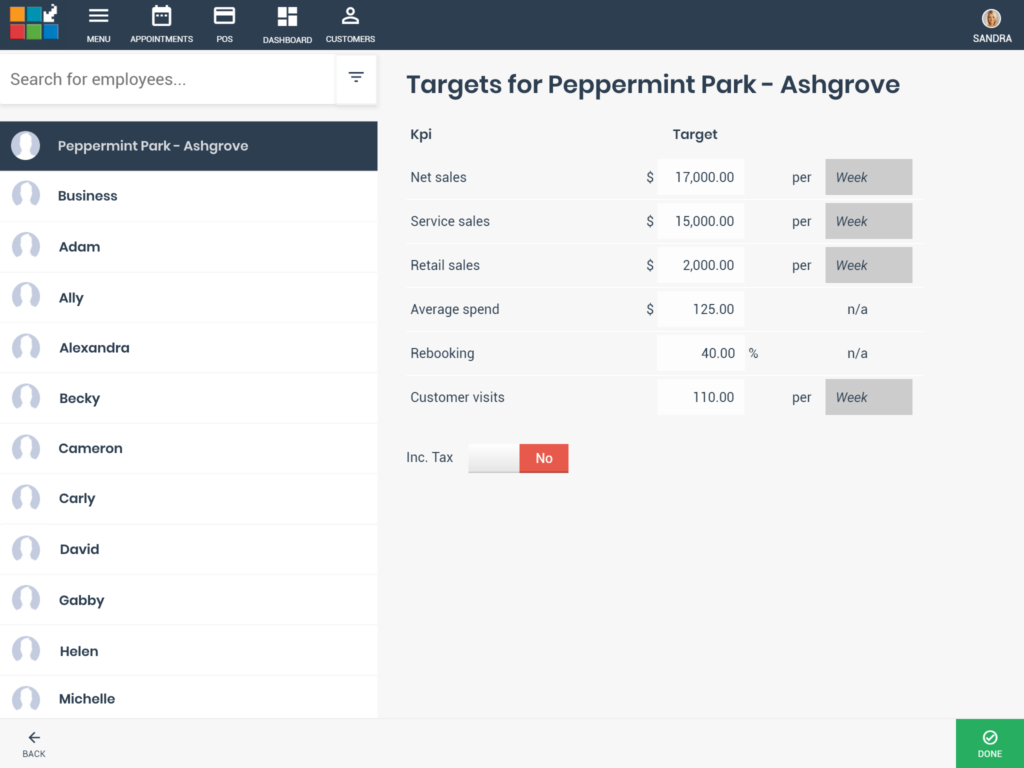Introducing Targets

Check it out
We think you’re going to love this!
Targets Numbers Explained

NOTE: All figures are net unless otherwise mentioned – I.e. If 5 retail items were sold and 1 was refunded, the net retail qty would be 4.
NOTE for Fusion users: All figures are net of discounts – I.e. Although a discount may be configured in Fusion to “Count towards employee income”, that setting will currently be ignored in Cloud Reporting. The Fusion functionality may be implemented in Cloud Reporting in a future release.
Are your Target figures inclusive or exclusive of tax?
To begin, specify whether your targets for the business and employees are inclusive or exclusive of tax using the ‘Inc Tax’ setting on the business Targets screen.
Net sales
Net Sales represents the total of sales that bring revenue to the business (product, service and sundry sales) in addition to sales that bring cash into the business that cannot be recognised as revenue (series, gift certificate and gift card, membership sales). Although Net Sales should not be used as an indication of the business revenue, it is useful for reconciling sales with takings.
This Target can be set for the business as a whole only, not individual employees – use Total sales for employees instead.
Total sales
The total value of all revenue tickets after discounts have been applied, where those tickets include products, services, sundry items or cancellation charges. Note that this figure does not include gift certificate, gift card or series sales, payments to account or upfront payments, since these are subsequently used to pay for products and services.
This Target can be set for employees only, not the business as a whole – use Net Sales for the business instead.
Service sales
Total service amount, after any discounts.
NOTE for Fusion users: This calculation differs slightly to how Fusion reports Service amounts. If a discount is configured in Fusion to “Count towards employee income for services”, that setting will currently be ignored in Cloud Reporting. The Fusion functionality will be implemented in Cloud Reporting in a future release.
Retail sales
The total amount of all retail sales, after any discounts.
NOTE for Fusion users: This calculation differs slightly to how Fusion reports Retail amounts. If a discount is configured in Fusion to “Count towards employee income for products”, that setting will currently be ignored in Cloud Reporting. The Fusion functionality will be implemented in Cloud Reporting in a future release.
Rebooking %
The percentage of clients who visited for a service and rebooked.
Rebooking is automatically credited to all employees who provided a service when a new appointment (rebooking) is created on the day of a visit. The future rebooking appointment does not need to be Completed/Checked out in order for the employee’s rebooking count to go up; however it will no longer count if it is cancelled.
NOTE for Fusion users: This calculation differs slightly to how Fusion calculates Rebookings. The Fusion rebooking prompt is not used. The manual rebooking credit system in Fusion can provide inconsistent results as it relies on the operator to record rebooking credits. The Cloud Reporting calculation is fully automated.
= Rebooking qty / Service visit count
Average spend (Average £ / ticket)
The average value of all tickets after discounts have been applied, where those tickets include products, services, sundry items or cancellation charges. Note that this figure does not include gift certificate, gift card or series sales, payments to account or upfront payments, since these are subsequently used to pay for products and services, at which point they will be included in the average ticket calculation.
Average £ / ticket = Total sales / Tickets
NOTE: A Ticket does not require the customer to have visited in-store, and can include membership and cancellation fees in addition to products, services and sundry sales. A transaction containing only refunds of these items will also count as a ticket. A transaction is not considered a ticket if it only includes gift certificate, gift card or series sales, payments to account or upfront payments, since these are subsequently used to pay for products and services, at which point they will be included in a ticket.
Customer visits
Represents the individual customers who have transacted in store each day. If a customer has 2 transactions within the one day, this is counted as 1 visit. A transaction only counts as a visit if it contains products, services or normal sundry sales. Transactions containing only credits to account, cancellation fees or upfront payments do not count as visits. Note that refund tickets with a net negative quantity will reduce the visit count. Click here to see how this can differ slightly to the Fusion figures if a customer processes 2 transactions on the same day.
*Software updates and new features including Targets are available to Shortcuts customers on ongoing maintenance only. If you are not currently on a maintenance package we will be in touch shortly to upgrade you. To continue using Targets you will also need to upgrade to an Essentials, Evolve or Elevate package.